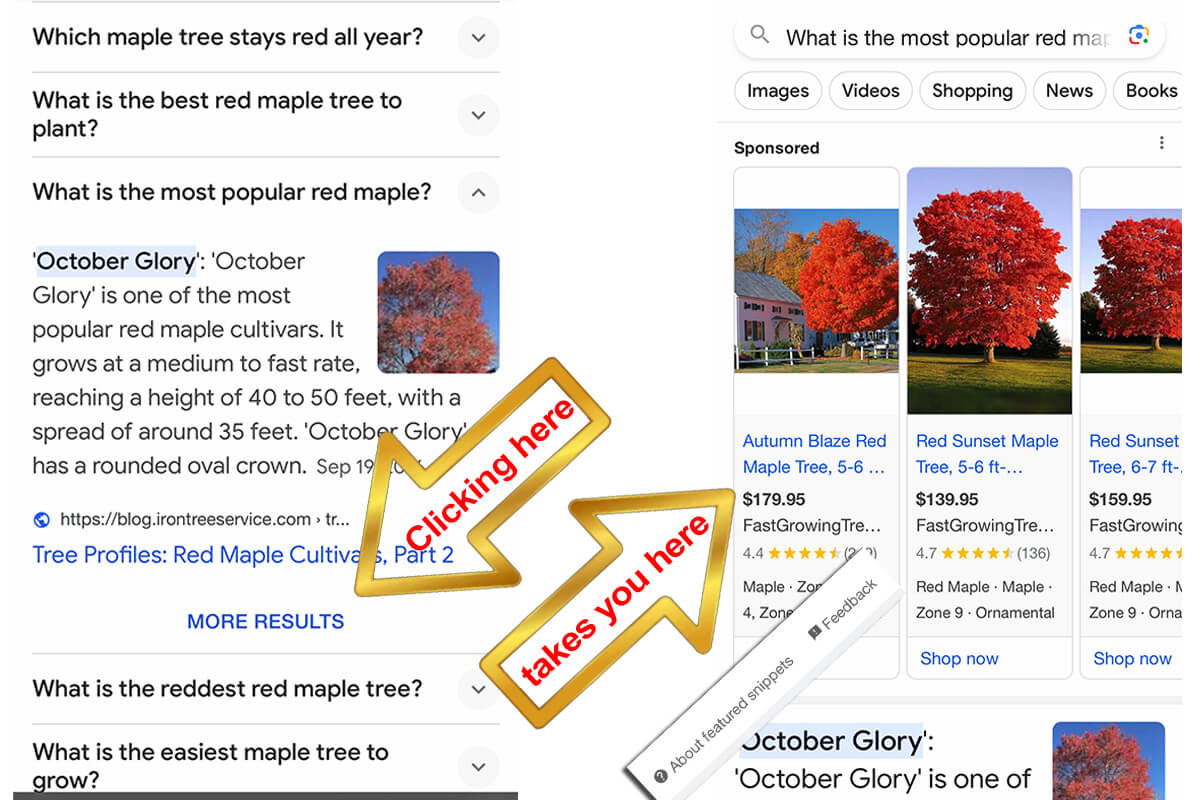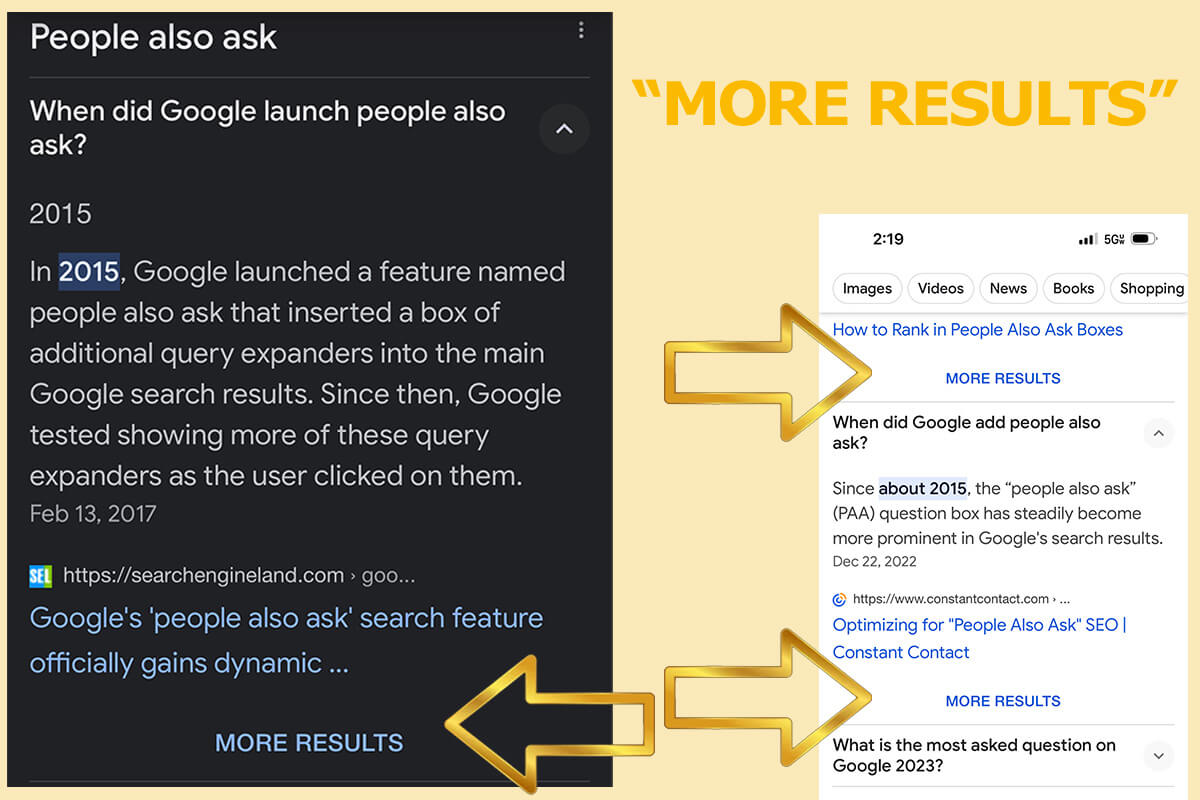New Question Answer SERP Types
We see the return of “MORE RESULTS” and multiple “question-answer” type search engine results pages (SERPs) tested and displaying various featured snippet formats, like “Questions related to your search.” Learn how to win a new question answer SERP
Generative AI Search is introducing more question-answer features going forward. This builds on Google’s role as a Answer Engine.
In January 2022, Google gained a U.S. patent related to selecting questions for “People also ask.” It may be the base it relies on today for testing similar features like PAA. Each one leverages actual search data and outputs in a question format.
FAQ and QA Schema Help Gain Visibility in Question Answer SERPs
The FAQ Schema purge continues as Google tests more user engagement and more results. As Google stated yesterday, most of our ongoing PAA tests now return “Questions related to your search.” And if you keep trying to find a better answer, “MORE RESULTS” may be triggered with a bit of a new twist.
I asked Head of SEO Comms at Wix Crystal Carter, “Is this new?”, she kindly responded to my question.
“I think it is. Normally it just says the question in bold. And you click it to get to the full SERP.”
Ensuring that your client business pages contain structured data markup can help get your data included in these question answer search displays. FAQ schema can nest within your article structured data markup.
Producing helpful, comprehensive web content should always be your priority. However, implementing schema where appropriate gives Google more to work with.
Alternatives to PAA in Google SERPs
What has or may display instead of Google’s People Also Ask feature:
- People are also asking.
- More results from the web.
- Related questions.
- Related searches.
- Related.
- Questions related to your search. (Most common today)
- Others want to know.
- More to ask.
- Others searched.
- Often searched Together.
- People also search for (PASF).
- See more.
- Others searched.
- What people be searchin (Seems odd)
Many SEO professionals and search marketers report Google Search ranking volatility and tremors starting aboutSeptember 12th. We expect with the new announcment to Google’s Helpful Content System and the depreciation of HowTo schema markup, many sites will see further losses of organic search traffic.
If you need to analyze drops in search traffic, we can help.
Google loves testing apparently. In Q1 of 2024, it is displaying a section in its search results titled “Results from the web” and “More results from the web.” One wonders how this Google Search results differes or is better from others onthe web?
How Search Engines Seek to Provide Query Answers Faster
The “People Also Ask” and each of these similar QA search results search engine results pages (SERPs) features are displayed on SERPs to provide additional context for the user’s original query.
Google and Bing intend to make it easier for their platform users to gain specific query answers faster. Tests are about giving people a smooth, fast, and hassle-free method of searching and gaining particular answers.
Repeatedly, we see Google providing pre-written questions that are generated from the most common issues or interest points that Google found and stored in their algorithm. This is true as well in the new Search Generative Experience’s “Ask a follow up” feature. This is a way to converse dynamically in Google Search and ask follow-ups.
Google uses/used a database of historical searches to populate which “People Also Ask” questions display. The queries are matched to the user’s current search intent using AI. Today, only authoritative sites seem to have a chance to win PPA SERP visibility.
Our tests so far find that it depends on which device I’m on, time of day, location, and browser. The following example was conducted September 13 within a few minutes in various ways.
For example my “What is a search marketer?” query pulls:
- “Related searches” after PAA on my MacBook Pro.
- “Questions related to your search” and “Additional searches” on desktop.
- “Questions related to your search” on my iPhone.
- “Ask a follow up” suggested query refinements when using SGE.
What is “MORE RESULTS” in Google PAA boxes?
“MORE RESULTS” appears after clicking on PAA questions related to your initial Google Search and still searching. This is always in all capital letters, which is different from “More search results” at bottom of your SERP after scrolling on mobile or earlier testings. It can also be triggered by clicking on a “Questions related to your search” drop down arrow.
Barry Schwartz reported Google testing ‘more results’ in mobile search interface
Google tests ‘more results’ mobile search interface and new search refinement buttons, Google told us, ‘We constantly experiment with new search formats and experiences to deliver the best experience for our users.'” Google tests ‘more results’ mobile search interface and new search refinement buttons – December 21, 2017.
“Google is officially testing a ‘more results’ button in the mobile search results interface. Instead of having to click to the next page of the Google search results, a searcher can click the ‘more results’ button, and additional search results will load below the current results.” – Google is officially testing ‘more results’ button to load more search results – April 10, 2018
How Does the “MORE RESULTS” SERP Feature Work?
Today when we click on the bottom of the pre-written questions, like PAA, it never stops. It always provides additional pre-written question options. Search engines want you find out exactly the answer that you’re searching for.
These featured snippets may be early ways to sort user engagement on the SERP that may later be included in Google’s Knowledge Graph Question Answer elements.
Algorithms sorting question answer content rely on a neural networks that continuously scan and gather information. Google search works like an encyclopedia of human knowledge to transform input into a search pattern and respond with corresponding optimal output. Also, Google Now provides immediate answers.
Are AI Answers changing the SERP game?
We know that Google’s search engine has undergone significant changes and is currently doing so. With the introduction of AI-generated answers and snippets and redesigning of the SERPs, marketers must be agile in their strategies.
Desktop and mobile results have been found with a dynamic loading display of the “Load More” button instead of pagination links. Paginated URLs display with #ip=1 on the end. In Google Search Generative Experiences, the “More Results” button in Google Search loads additional links on the same web page. This lets searchers view more results faster.
Previously, a searcher needed to click a “next” button and wait for another Google page to display. Now, clicking the “More Results” button is simply a matter, and additional search results will load below the current display. Consider entity-based optimization to show up more often in the SERPs.
How Google Sources Question Answering SERPs
By clicking on the 3 dots in the upper right-hand corner near one of its search results, an “About this result (beta)” appears. We’ll compare this information below as it offers some insight into how the tech giant selects these displays.
About this result (beta):
- People also ask – “These questions are related to your search terms and may be helpful as a next step.” In the GSC, we’re seeing “These are questions people commonly search on Google.”
- Questions related to your search – “These are questions people commonly source on Google”
- People also search for – “These are related searches that other people have done”
- Additional searches – “These are related searches that other people have done”
- Individual question poised and answered directly (Like in SGE) – “Google gathered this content from across the web about a topic that other people search for”
New single card-like Question Answer SERP type showing up
Google introduced its “Continuous Scrolling” feature to help searchers avoid having to navigate across pages to find the relevant search results. As it aggressively tests and refines it Search Generative Experience, we find at the bottom of SERPs more SGE like individual questions are asked. They present with the format and colored background as in the SGE.
Google’s “Generating Query Variants Using A Trained Generative Model” patent granted and published on May 30, 2023 offers us insights. [1] It talks about relying on a trained generative model to generate query variants for SERP features – even mentioning “People Also Search For”. If it is like other patents, this may well be part of the process that could be used for PAA, “MORE RESULTS”, and “Questions related to your search”.
Question-Answer SERPs Change to Align with Search Intent
NOTE: These are different from a SERP answer box, which may show up at the top of the results. These SERP snippets provide a short answer to the query. However, like the other question answer SERP types, it it helps searchers get the information they were seeking without having to jump from website to website.
We tend to also bulk the type of question-answer SERP for temperature, mathematical calculations, widely known factual QA and other such related queries. The “MORE RESULTS” button surfaces when either the query wasn’t clear or there is no direct, ideal answer from a trusted source to initially provide.
We recommend striving to improve your domain and content’s E-E-A-T factor by prioritizing publishing the best content available in your niche. When you fill gaps in needed question answering SERPs, you will be prepared for winning more organic search visibility.
Google is striving to being helpful and provide the user the answer in the quickest and most direct format possible. A complete content SEO strategy is necessary to succeed in gaining Google’s trust and therefore have your answers cited as “sources.” Read our common search marketing FAQs to gain a broader understanding.
CONCLUSION: “More Results” is back & “Questions related to your search” Replaces PAA
How we execute our content creation and marketing strategies will emerge as more opportunities provide answer-rich helpful content. Emerging question answer SERP features are all about being more helpful to people.
Call 651-206-2410 to move on getting a fresh Google SERP Analysis & Discovery
References
[1] https://patents.google.com/patent/US11663201B2/
